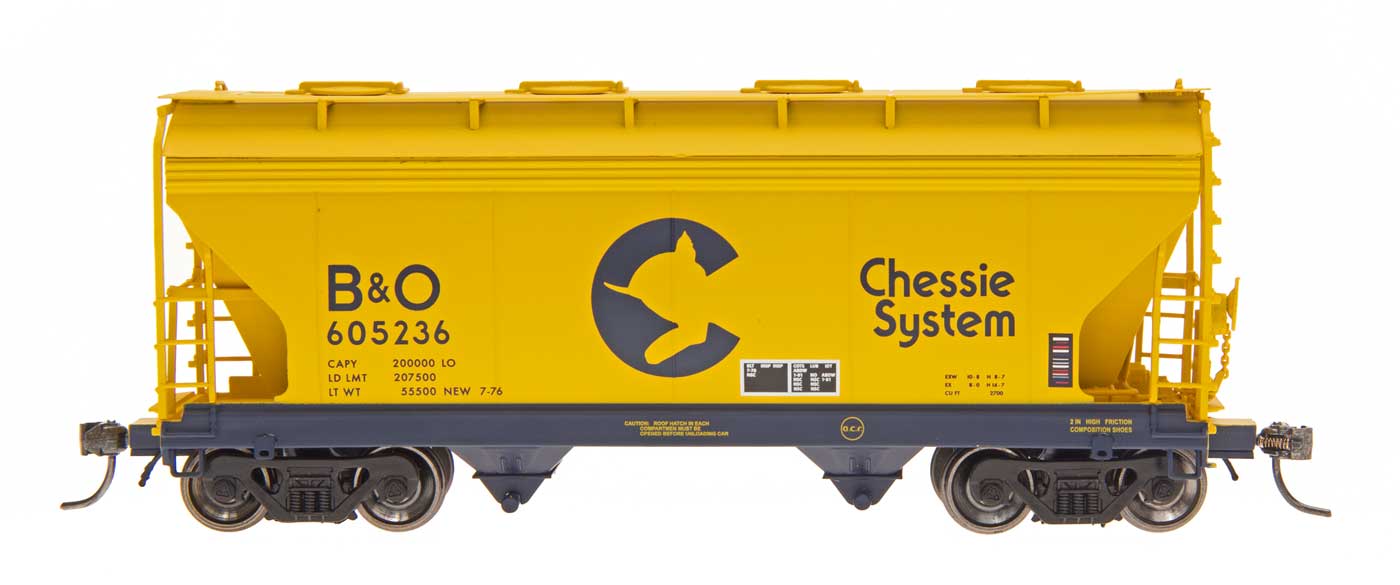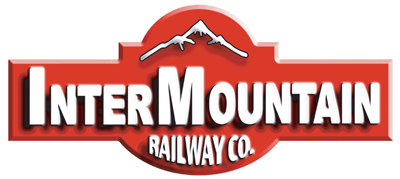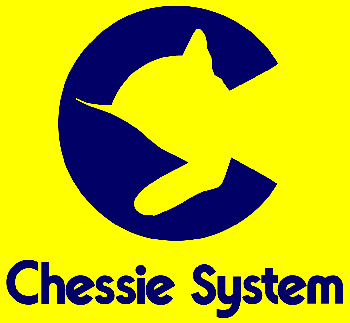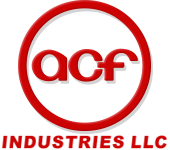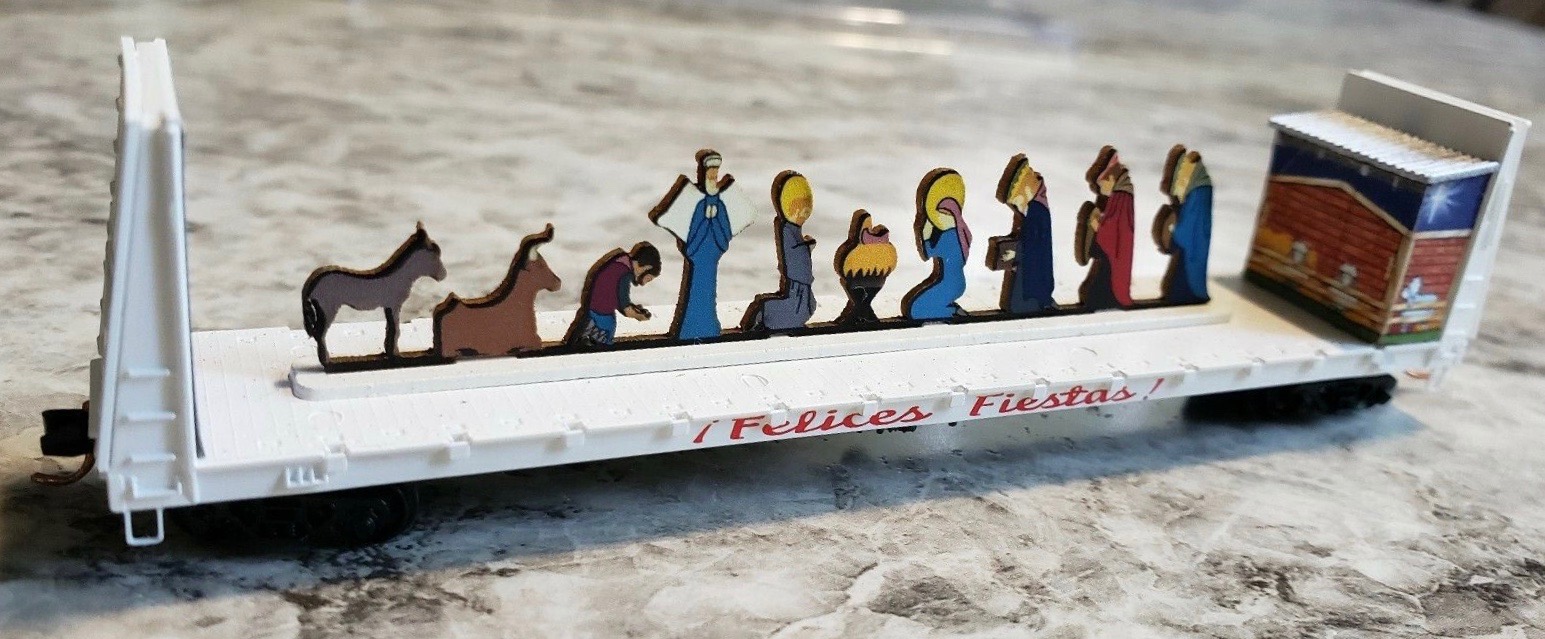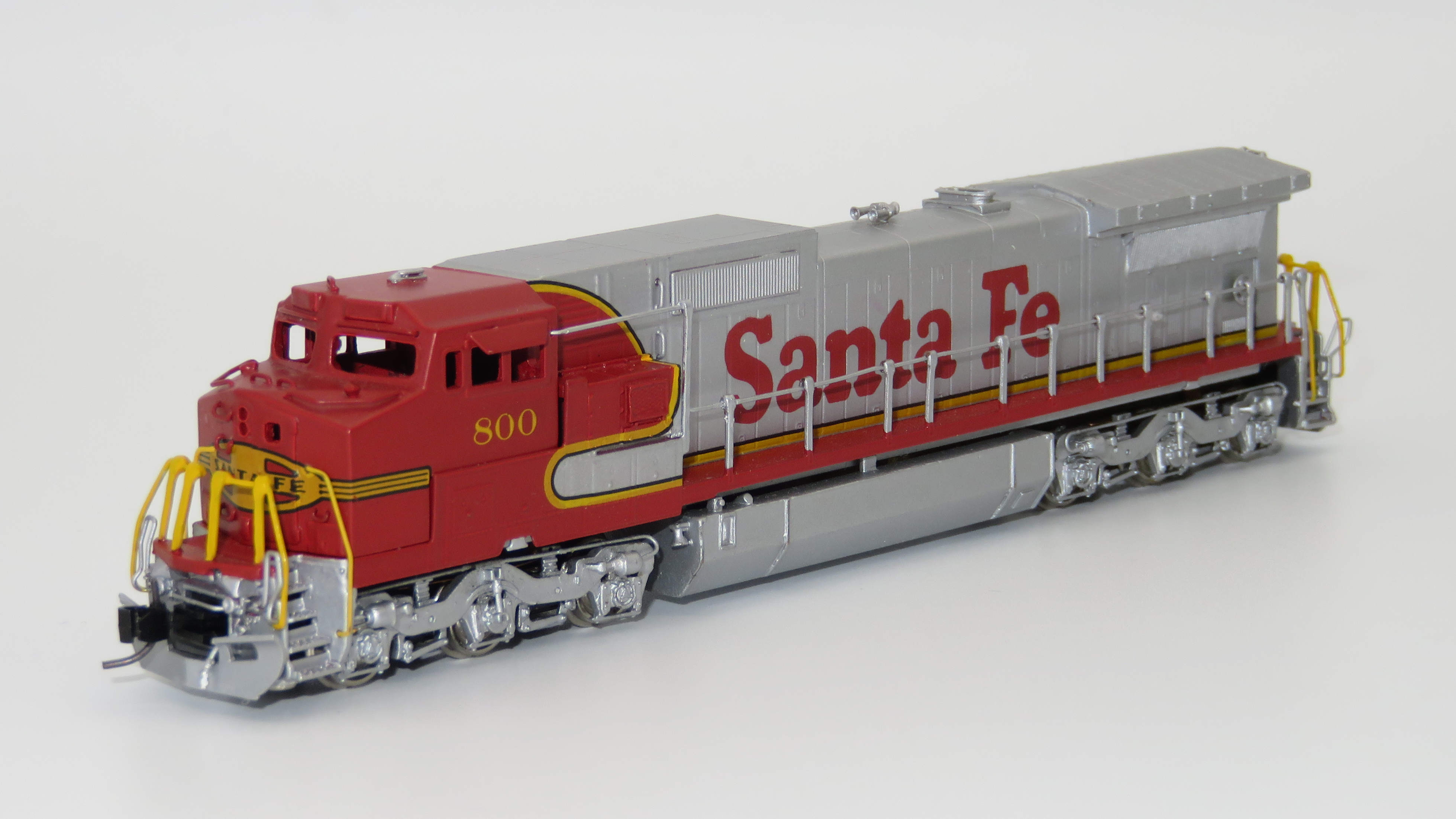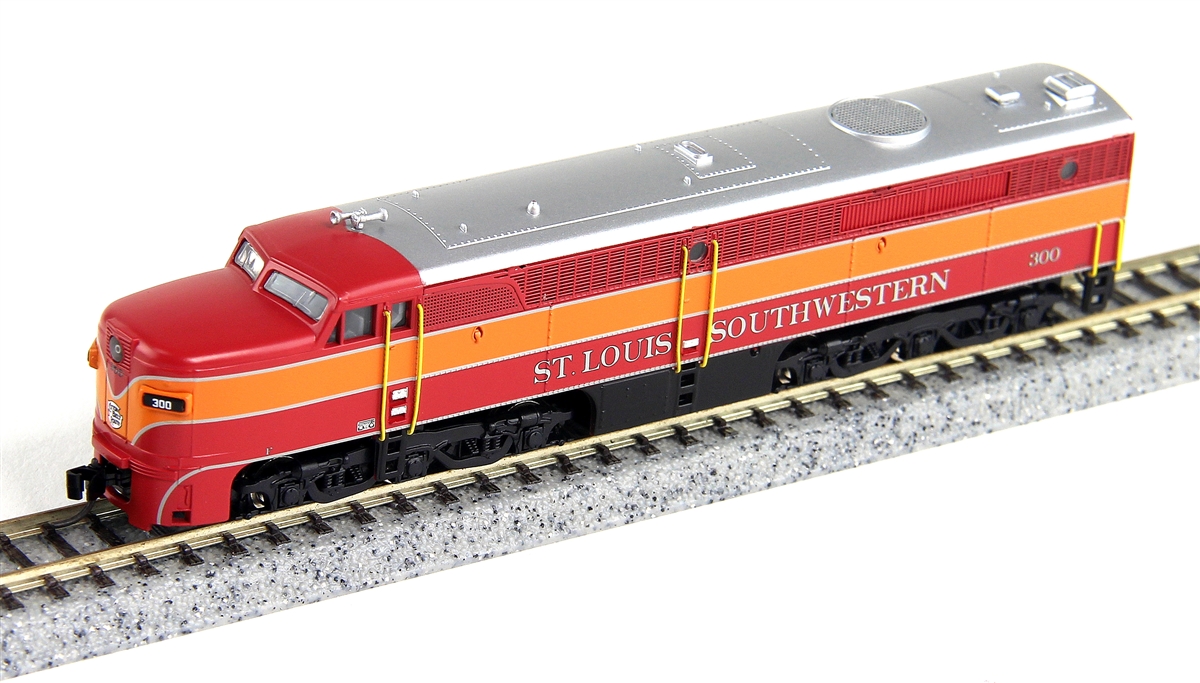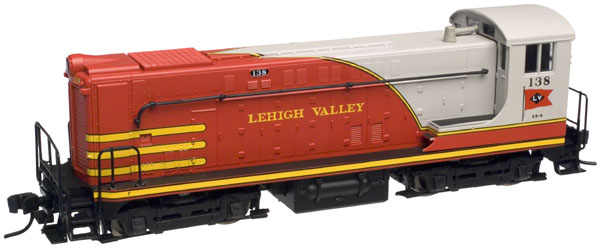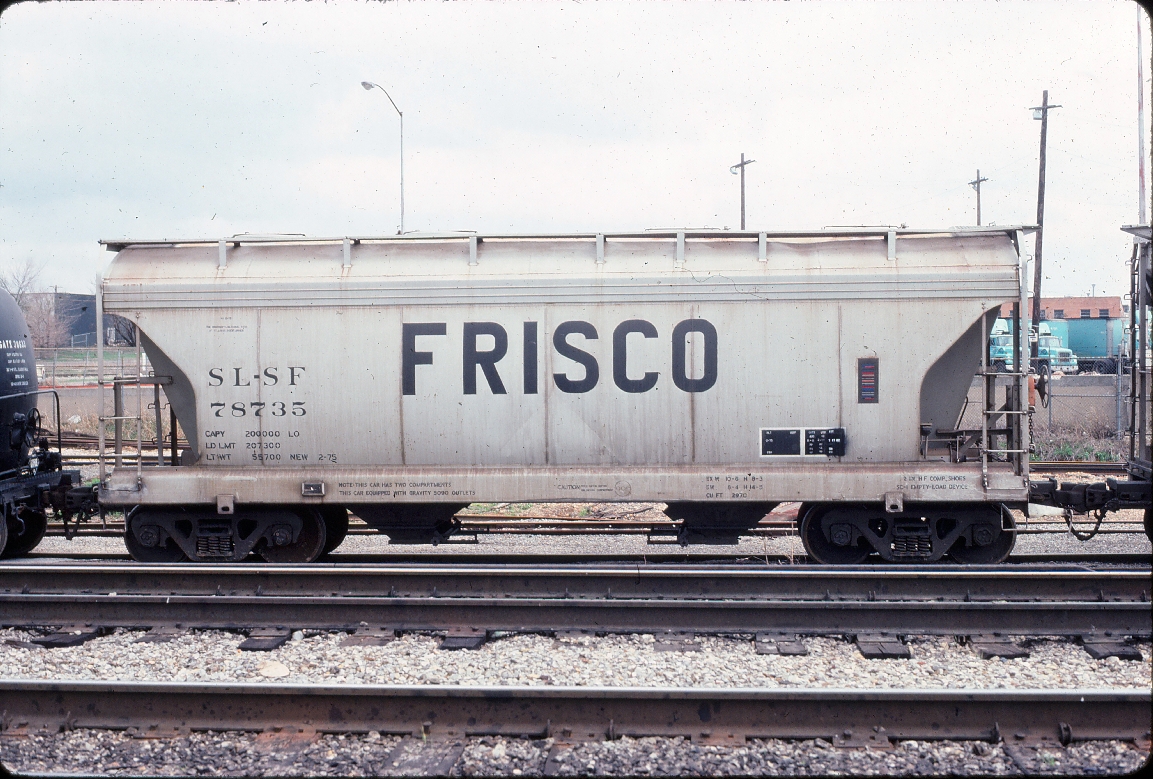Specific Item Information: Built: NEW 7-76
Prototype History: The 2-bay covered hopper first entered service in the 1950s. The cars handle loads such as cement, sand and similar denser bulk commodities. In the 1960s, American Car and Foundry introduced the Centerflow design. The Centerflow relies on the car's rounded body to provide structural strength without the added weight of bracing, as well as making gravity unloading easier. This 2-bay car came in a 2,970-cubic foot capacity.
The first ACF covered hoppers were rib-side cars, like many others of the time. In the 1960's ACF eliminated the supporting ribs and started building what they called the Center Flow(R) hopper with a smooth, rounded side. The cars were built at several ACF plants, but the Huntington, West Virginia plant built only Center Flow cars since their inception and was the primary builder.
The first ACF covered hoppers were rib-side cars, like many others of the time. In the 1960's ACF eliminated the supporting ribs and started building what they called the Center Flow(R) hopper with a smooth, rounded side. The cars were built at several ACF plants, but the Huntington, West Virginia plant built only Center Flow cars since their inception and was the primary builder.
Road Name History: Chessie System, Inc. was a holding company that owned the Chesapeake & Ohio Railway (C&O), the Baltimore & Ohio Railroad (B&O), the Western Maryland Railway (WM), and several smaller carriers. It was incorporated in Virginia on February 26, 1973, and it acquired the C&O (which controlled the other companies) on June 15. C&O had been popularly known as "Chessie System" since the 1930s.
The three railroads had been closely related since the 1960s. C&O had acquired controlling interest in B&O in 1962, and the two had jointly controlled WM since 1967.
On November 1, 1980, Chessie System merged with Seaboard Coast Line Industries to form CSX Corporation. However, the Chessie image continued to be applied to new and re-painted equipment until mid-1986, when CSX introduced its own paint scheme. The B&O and C&O were not legally merged out of existence until 1987, when the company's official successor, CSX Transportation was founded.
Headquartered in Cleveland, Ohio, the Chessie System was the creation of Cyrus S. Eaton and his prot?g? Hays T. Watkins, Jr., then president and chief executive officer of C&O. A chief source of revenue for the Chessie System was coal mined in West Virginia. Another was the transport of auto parts and finished motor vehicles.
The signature symbol of the Chessie System was its "Ches-C", a large emblem incorporating the outline of the C&O's famous "Chessie" the kitten logo. The Ches-C was emblazoned on the front of all Chessie System locomotives, and also served as the "C" in "Chessie System" on the locomotive's flanks, and on other rolling stock. The Chessie System itself did not own any locomotives or other rolling stock; rather, equipment would be placed on the roster of one of the three component railroads. While all three companies shared a common paint scheme of yellow, vermillion, and blue, actual ownership of the equipment was denoted by the reporting marks C&O, B&O, or WM.
From Wikipedia
The three railroads had been closely related since the 1960s. C&O had acquired controlling interest in B&O in 1962, and the two had jointly controlled WM since 1967.
On November 1, 1980, Chessie System merged with Seaboard Coast Line Industries to form CSX Corporation. However, the Chessie image continued to be applied to new and re-painted equipment until mid-1986, when CSX introduced its own paint scheme. The B&O and C&O were not legally merged out of existence until 1987, when the company's official successor, CSX Transportation was founded.
Headquartered in Cleveland, Ohio, the Chessie System was the creation of Cyrus S. Eaton and his prot?g? Hays T. Watkins, Jr., then president and chief executive officer of C&O. A chief source of revenue for the Chessie System was coal mined in West Virginia. Another was the transport of auto parts and finished motor vehicles.
The signature symbol of the Chessie System was its "Ches-C", a large emblem incorporating the outline of the C&O's famous "Chessie" the kitten logo. The Ches-C was emblazoned on the front of all Chessie System locomotives, and also served as the "C" in "Chessie System" on the locomotive's flanks, and on other rolling stock. The Chessie System itself did not own any locomotives or other rolling stock; rather, equipment would be placed on the roster of one of the three component railroads. While all three companies shared a common paint scheme of yellow, vermillion, and blue, actual ownership of the equipment was denoted by the reporting marks C&O, B&O, or WM.
From Wikipedia
Brand/Importer Information: InterMountain was founded in 1985 by Fred Brummet. They got started in the model railroad business by producing O-Scale model kits. They got started in the N Scale business almost a decade later when in 1994 they introduced the 40-23 reefer car in kit form. Later, in 1998, they started producing RTR (Ready-to-Run) models. By the early 2000s, InterMountain phased out kit production in favor of the RTR models.
The InterMountain Railway company is located at 1224 Boston Ave in Longmont, CO. They are a manufacturer of HO, N and Z scale model trains. They have produced kits as well as RTR (Ready-To-Run) models. Their N Scale products include locomotives as well as rolling stock. Their rolling stock lineup includes Boxcars, Hoppers, Tank Cars, Reefers, Gondolas, Stock Cars and Flatcars.
Their locomotive releases have primarily been diesel units, with the one major exception being their series of AC-12 Cab Forward steam locos. Their diesel lineup includes F3's, F7's, F9's, SD40's, SD45's and FT units. They are known for quality and detail. They also release their rolling stock in larger varieties of road numbers than most of the other manufacturers.
The InterMountain Railway company is located at 1224 Boston Ave in Longmont, CO. They are a manufacturer of HO, N and Z scale model trains. They have produced kits as well as RTR (Ready-To-Run) models. Their N Scale products include locomotives as well as rolling stock. Their rolling stock lineup includes Boxcars, Hoppers, Tank Cars, Reefers, Gondolas, Stock Cars and Flatcars.
Their locomotive releases have primarily been diesel units, with the one major exception being their series of AC-12 Cab Forward steam locos. Their diesel lineup includes F3's, F7's, F9's, SD40's, SD45's and FT units. They are known for quality and detail. They also release their rolling stock in larger varieties of road numbers than most of the other manufacturers.
Item created by: petecduffy on 2019-02-28 09:28:16
If you see errors or missing data in this entry, please feel free to log in and edit it. Anyone with a Gmail account can log in instantly.
If you see errors or missing data in this entry, please feel free to log in and edit it. Anyone with a Gmail account can log in instantly.


